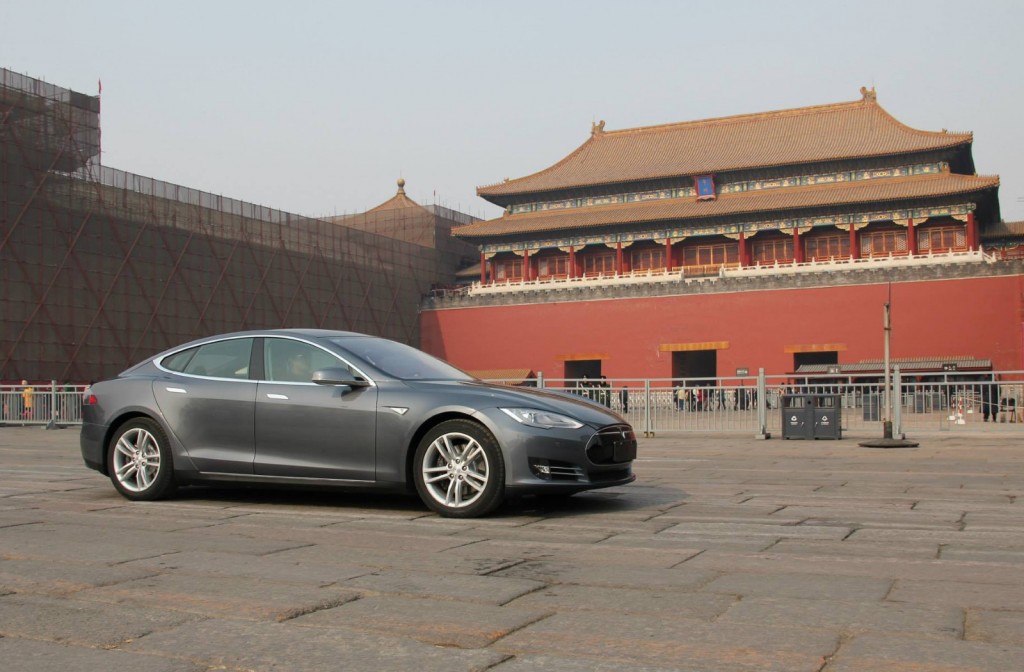It all started when stock analysts circulating an estimate from auto-industry trade journal Ward's Auto that Tesla's U.S. sales were down 26 percent for the first nine months of 2014, compared to the same period in 2013..
It was covered in a Wall Street Journal story on the company's new lower-cost leasing program, and Tesla's stock price fell.
On Tuesday, Tesla Motors CEO Elon Musk took to Twitter, saying, "Article in WSJ re Tesla sales is incorrect. September was a record high WW [worldwide] and up 65% year-over-year in North America."
![2013 Tesla Model S on Chilcotin Highway, Canada [photo: owner Vincent Argiro] 2013 Tesla Model S on Chilcotin Highway, Canada [photo: owner Vincent Argiro]](https://images.hgmsites.net/lrg/2013-tesla-model-s-at-tk-in-canada_100464947_l.jpg)
2013 Tesla Model S on Chilcotin Highway, Canada [photo: owner Vincent Argiro]
Musk's tweet was, of course, retweeted 800 times and favorited more than 1,100.
The same day, David Zoia of Ward's appeared on CNBC to defend the estimate and its methodology.
Then the legions of Tesla faithful and Tesla doubters began to pile on.
In its most extreme retelling, this was either:
- an example of a desperate CEO spinning a clear decline in his failing business of making a car that no one else will ever buy,or
- yet another attempt by the Evil Auto Industry to discredit the revolutionary company and its rock-star CEO to keep the world in the greedy hands of Big Oil.
It all got a little exhausting, frankly.

2014 Tesla Model S in China
We'll find out the real numbers next Wednesday, when Tesla releases its third-quarter financials and Musk hosts a conference call for analysts.
Some analysts suggest that each report is right: Tesla's U.S. sales may well have declined this year, while Musk addressed solely September sales.
The company shut down its assembly line in Fremont, California, this July for retooling to add the Model X crossover and boost production of the Model S as well.
DON'T MISS: Why Is Tesla Scared To Release Its Electric-Car Sales Data? (Jun 2012)
But this is one battle that Tesla brought entirely on itself.
As we've noted numerous times, Tesla Motors is the sole automaker of consequence not to report monthly sales the day after the sales month closes.
Every other automaker selling in the U.S. issues numbers--some more detailed, some less, but all breaking down sales at least by model line.
![Tesla Store Los Angeles [photo: Misha Bruk / MBH Architects] Tesla Store Los Angeles [photo: Misha Bruk / MBH Architects]](https://images.hgmsites.net/lrg/tesla-store-los-angeles-photo-misha-bruk-mbh-architects_100449434_l.jpg)
Tesla Store Los Angeles [photo: Misha Bruk / MBH Architects]
Tesla first justified its lack of data by saying that its investors didn't think it was important.
Now it's a public company, so the rationale--the last time we checked--has hardened into, "We're Tesla, and we do things differently."
Which is all well and good, except that the company can hardly complain if an interested world attempts get the concealed data through other means.
From serial-number logs to estimates by industry experts, if the real data isn't being provided, people will do their best to estimate.

Tesla Motors CEO Elon Musk delivers first Tesla Model S electric cars in Tokyo, Sept 2014
If Tesla simply issued its monthly sales by country early in the following month, all of this could have been avoided.
That would have been one tweet Musk didn't need to send.
But, hey, it's Tesla. They're different.
_______________________________________________













